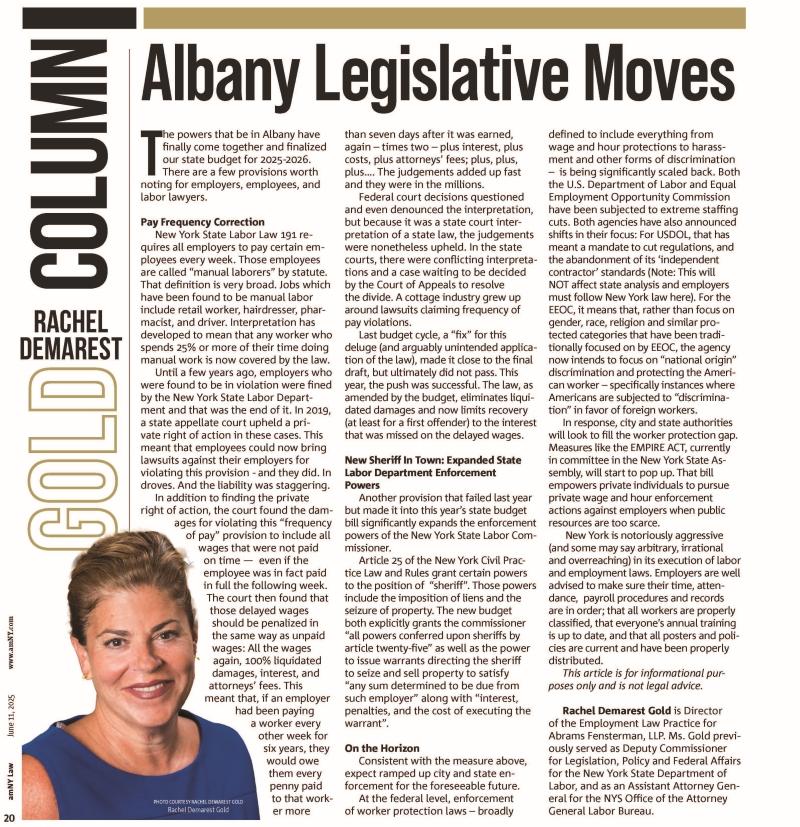Is Irresistible Attraction Grounds for Firing?
I cannot count the number of friends I have had over the years who would have given their eyeteeth to be “irresistible.” But now, in view of an Iowa Court’s ruling, it is doubtful that being irresistible is a blessing.
Plaintiff Melissa Nelson had worked for a dentist, James Knight, for more than ten years, when he developed a crush on her. They began to text each other on both work and personal matters, outside the workplace. Knight admitted making racy comments, including responding to Nelson’s statement about her infrequent sex life, “that’s like having a Lamborghini in the garage and never driving it.” But Nelson never complained about the banter, and she never alleged that she was sexually harassed.
Apparently, the only person who did not like the relationship was Knight’s wife, who also worked for him. Once she discovered the text messages, the wife insisted that Knight fire Nelson. He did fire her. Nelson sued, claiming that the firing was discriminatory, because of her gender.
The public was waiting greedily for the result of the case when, to their surprise, the all male panel of judges upheld dismissal of the lawsuit, ruling that the dentist did not break the law in firing the employee. For those of you who read the September/October RBA Chamber Newsletter article on “Workplace Sexual Harassment: Taking a Second Look at Title VII,” the question was, “how could that be”?
The answer is simple; the judges were following existing case law. First, Nelson argued that she would not have been terminated except for her gender. But, the gender protection provided by the antidiscrimination laws only covers discrimination caused by gender, not adverse employment action because of a perceived threat to Dr. Knight’s marriage.
In other words, Nelson was not fired because she was a woman; she was fired because Dr. Knight’s wife perceived her to be a threat to the marriage. The court determined that an employer does not engage in unlawful gender discrimination by discharging a female employee who is involved in a consensual relationship that has triggered personal jealousy. There is a long line of cases, including some from New York, holding that when an employee consensually engages in flirtatious behavior or consensual sexual behavior, the anti-discrimination laws are not implicated because the conduct is welcome. In fact, the New York courts had ruled in just that manner more than a decade ago. In that case, Mauro v. Orville, an attorney had an intimate affair with his office manager. He separated from his wife, but when he and his wife chose to reconcile, the wife demanded that Attorney Orville fire the office manager. When he fired her, she sued for gender discrimination and sexual harassment. The Court dismissed the case, holding that firing an employee because of a failed voluntary sexual relationship is neither gender discrimination nor sexual harassment.
But, Nelson argued in the Iowa case, she had not engaged in a voluntary intimate relationship with Knight. To the contrary, the only reason why she was fired, was because he was afraid he might not be able to control himself enough to avoid a future relationship. Thus, the Iowa court had to answer the next generation question, which was whether an employee who has not engaged in flirtatious conduct may lawfully be terminated because her boss views her to be an irresistible attraction. Nelson argued that any termination because of a boss’s physical interest in an employee must be gender discrimination, because the employee’s sex is implicated by the nature of the termination. The Court disagreed. While the decision may have been unfair, the law does not protect against decisions that are simply unfair. Instead, it protects against discrimination because of a protected category such as gender. In this case, the decision was based on the wife’s jealousy, not Nelson’s gender.
The court pointed out that the determination might be different if the employer repeatedly took adverse action against persons of a particular gender because of alleged personal relationship issues, or if the employer made gender stereotypes. Here, it was an isolated situation, where Mrs. Knight viewed Nelson as a threat to her marriage.
Last, the Court found that the conduct did not constitute sexual harassment. Sexual harassment is only actionable if it is unwelcome sexual conduct. Here, there was no evidence that Nelson was forced to submit to sexually based harassment as a condition of employment. Instead, Dr. Knight made an isolated decision to terminate Nelson before any hostile work environment occurred.
While at first glance, the public was aghast that Nelson had no recourse for her firing, an analysis demonstrates that the Court was likely correct, given the current status of the law. But Nelson was not without remedy. Instead of accepting her boss’s comments, she had the option of complaining about his conduct if she truly didn’t like it. And if she complained and it continued, or if she was fired for complaining, her conduct would likely have been protected. In sum, while Knight thought he could not help himself in the face of the irresistible Nelson, Nelson had other options available to her which would have offered her some protection under the law. Nonetheless, one must question whether it is desirable to aspire to be “irresistible”.
Sharon Stiller directs the employment law practice and the Rochester office for Abrams, Fensterman, Fensterman, Eisman, Formato, Ferrara, & Einiger, LLP, with offices in Rochester, Long Island, Manhattan and Brooklyn. She is also the author of “Employment Law in New York”, published by West/Thomson Reuters.
This was originally published by Rochester Business Alliance. Distribution or re-transmission without written consent of the copyright owner is prohibited.





